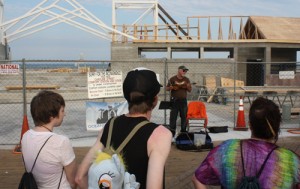
OCEAN CITY — Ironically just in time for the Fourth of July and all of the crowds and noise the holiday brought, a federal judge last Wednesday issued a preliminary injunction prohibiting the town of Ocean City from enforcing its 30-foot noise ordinance as it relates to street performers.
On April 10, the American Civil Liberties Union (ACLU) filed suit in federal court on behalf of violinist William Hassay, Jr. challenging the town’s noise ordinance changes on the Boardwalk the organization believes are an attempt to silence musicians. In the suit filed against the Mayor and Council and then-acting-Police Chief Michael Colbert, the ACLU alleges the enforcement of the town’s 30-foot noise ordinance on the Boardwalk infringes on Hassay’s, and other performers’ fundamental right under the First Amendment to engage in freedom of speech and expression in a public forum.
While the suit ultimately seeks a reversal of the town’s changes to its noise ordinance on the Boardwalk, the legal process could take several months to unfold. In the meantime, Hassay’s attorneys were seeking a preliminary injunction, which, if approved, would force the town to suspend the enforcement of the 30-foot rule on the Boardwalk until the case is resolved, likely the rest of the current summer season.
A hearing on the proposed preliminary injunction was held on June 10 during which both parties presented the merits of their respective cases. On Wednesday, July 3, U.S. District Court Judge Ellen Hollander issued an opinion granting the preliminary injunction and essentially prohibiting the town from enforcing the 30-foot rule for street performers on the Boardwalk until the case is resolved, likely the remainder of the summer season.
“In the absence of preliminary injunctive relief, the plaintiff will suffer irreparable injury, in the form of deprivation of his right to freedom of expression, as guaranteed by the First Amendment,” the opinion reads. “Further, the balance of the equities favors the plaintiff and an injunction is in the public interest. Accordingly, I will enter a preliminary injunction against the enforcement of the 30-foot audibility restriction as to the Boardwalk.”
In her opinion, Hollander essentially said she understood the intent of the town of Ocean City’s noise ordinance on the Boardwalk, but the ordinance did not hold up to First Amendment scrutiny.
“I do not question the legitimacy of the defendants’ interest in restricting excessive noise on the Boardwalk,” the opinion reads. “But the means employed by Ocean City to achieve its goals reach far broader than necessary. The 30-foot audibility restriction, which categorically prohibits music played at the level of most human activity, is not narrowly tailored to prevent excessive noise. Therefore, the 30-foot audibility restriction fails to satisfy the second prong of intermediate scrutiny.”
In the wake of the preliminary injunction ruling, street performers and musicians, including Hassay, were out en masse along the Boardwalk this week, just as they have been all summer. While most attracted large crowds, their volume was decidedly lower than it has been in the past, suggesting an effort to at least comply with the rules despite the victory on the preliminary injunction.
In her opinion filed last week, Hollander said under any definition, the Ocean City Boardwalk qualifies as a public forum and Hassay’s music qualifies as a protected form of free speech.
“Indisputably, Hassay’s music qualifies as protected speech and Ocean City does not contend otherwise,” the opinion reads. “That Hassay receives donations for his performances does not alter the status of his musical expression because protection under the First Amendment is not lost if the speech is sold rather than given away.”
According to the civil suit, on two separate occasions last June, Hassay was threatened by Ocean City police officers with citations for violations of the noise ordinance while playing his violin music on the Boardwalk. As a result of the alleged coercion, Hassay stopped playing for the remainder of the season causing great financial loss and perhaps more importantly, a violation of his basic First Amendment rights to freedom of expression in a public forum.
However, the town of Ocean City this spring filed a motion to dismiss the suit, asserting Hassay was merely approached by an OCPD officer after complaints from retailers in the area where he was performing and asked to turn down the volume of his music
to conform to the 30-foot rule. The town’s motion to dismiss asserts the officer never issued a citation or threatened Hassay with arrest, but rather intended to educate the Boardwalk performer on the recent changes in the town’s ordinance.
“What Hassay does not allege in his complaint, however, is a substantive injury or objective harm caused by the noise ordinance or its enforcement,” the town’s answer reads. “Hassay’s complaint merely alleges that as a result of the noise ordinance, he had a conversation with several Ocean City Police officers which resulted in his feeling that he was deterred, or ‘chilled,’ from exercising his First Amendment rights. However, the record before the court in the matter is clear that, as it relates to Hassay, no enforcement of the noise ordinance ever occurred.”
